This post may contain affiliate links. Learn more.
If you’ve ever been to a catered Italian-American event, you probably know Chicken Francese. Making it well at home is a revelation. This recipe yields tender chicken with the dish’s iconic coating and a beautifully silky, lemony sauce.
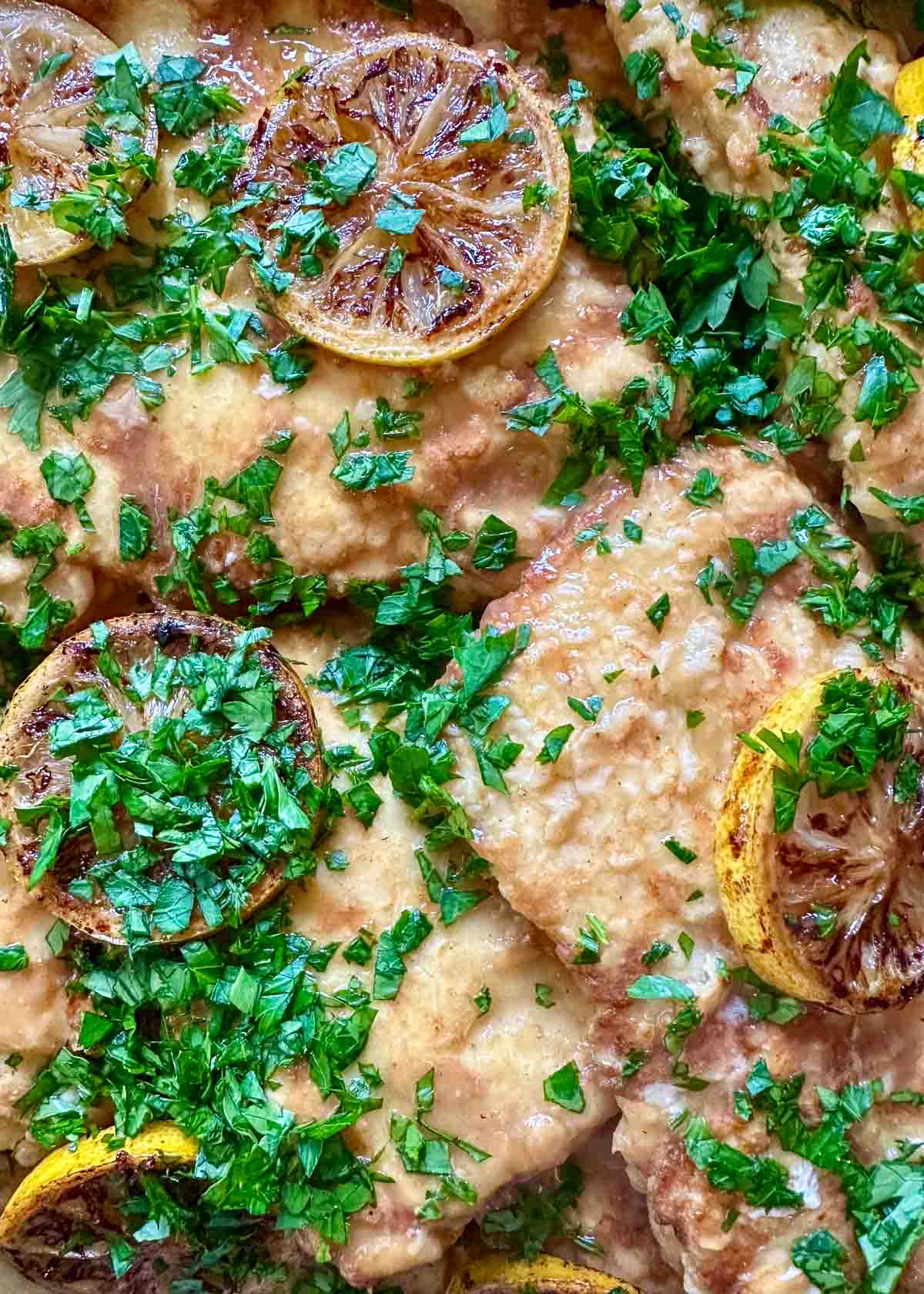
Why you’ll love this recipe
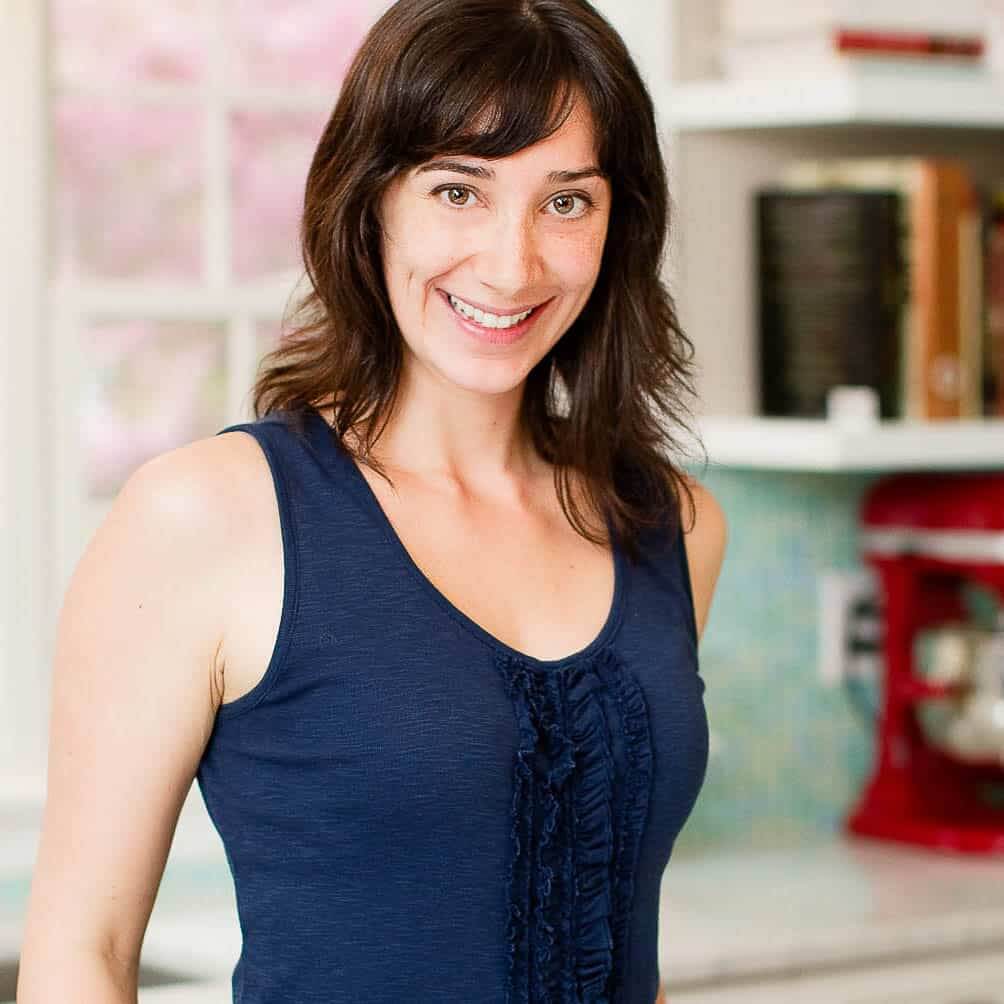
There’s something so empowering about making “restaurant food” at home, and Chicken Francese is an easily achievable way of chasing this feeling. (Not to mention ending up with a satisfying dinner for six.)
My recipe:
- Punches up the flavors just a touch (as usual!)
- Includes plenty of the silky sauce everyone will want more of
- Teaches you the classic techniques without extra fuss
- Makes great leftovers
A brief, murky history of Chicken Francese
Repeat after me: Chicken Francese is not French, and it’s not Italian. If you have trouble remembering how to pronounce its name like I do sometimes even though my family is Italian-American, it’s because the pronunciation (two syllables with a “ch” in the middle) does not strictly follow the rules of any language.
As with virtually all iconic dishes, the exact origin in hotly disputed, but it seems clear that this dish was created in the United States (most likely in NYC) as a less-expensive and eventually more-popular alternative to similar veal dishes. You can learn more here.
What you’ll need
Here’s a glance at the ingredients you’ll need to make this recipe.
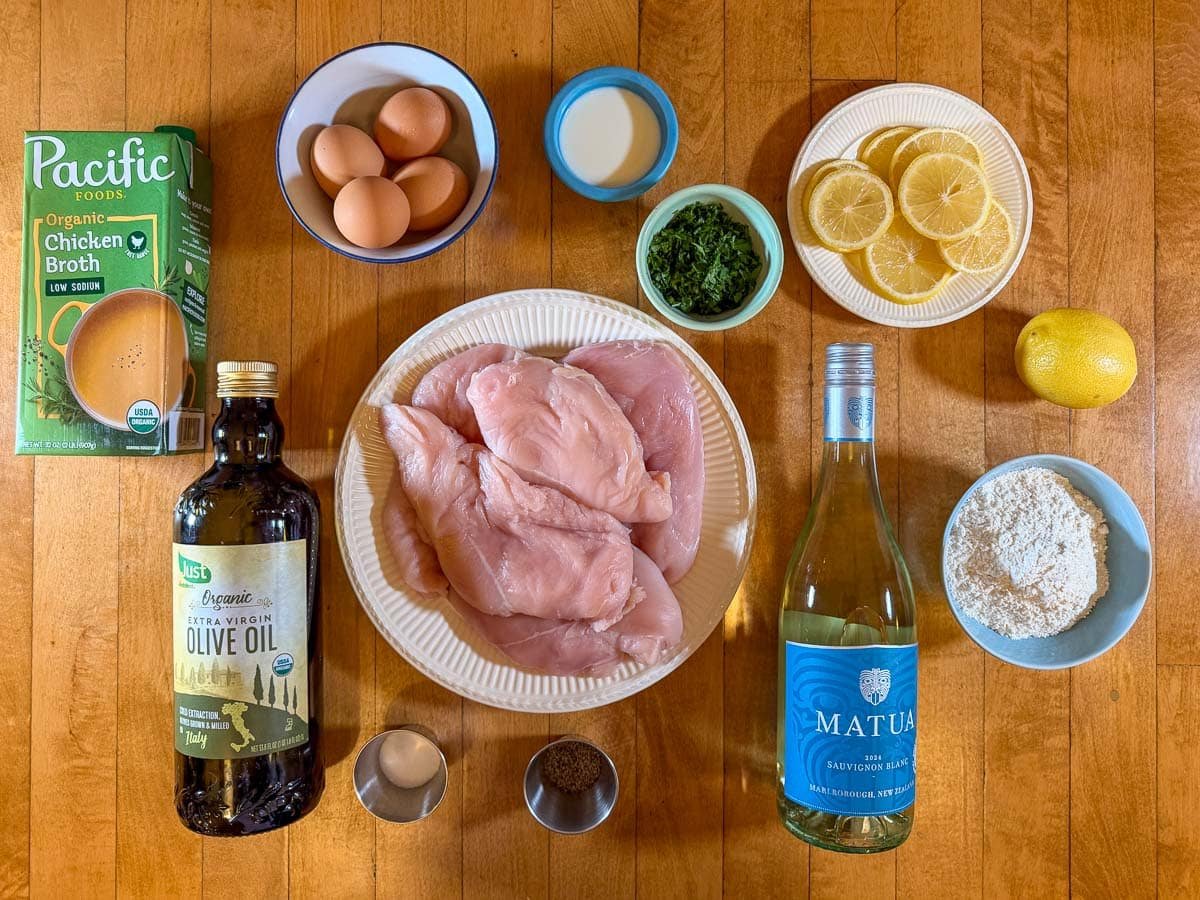
- You’ll start with boneless, skinless chicken breasts. I’ll show you how to prep them so they cook evenly and stay beautifully tender.
- A mixture of all-purpose flour, salt, and pepper makes up the first layer of the iconic crust on the chicken. Toward the end of cooking, you’ll mix some of this remaining mixture with butter to make a smooth paste called a buerre manie, which will thicken the sauce. You can substitute a good-quality 1:1 gluten-free flour blend for the all-purpose flour to make this dish gluten-free.
- An egg wash made with eggs, whole milk, and salt makes up the second layer of the chicken’s coating. You’ll have some left over, but I find it much easier to have a little more than you need so that the last pieces of chicken get properly coated.
- You’ll lemon twice, once to slice and once to juice.
- Use a dry white wine that you enjoy drinking. I often use an affordable New Zealand Sauvignon Blanc like the one pictured here.
- A lower-sodium chicken broth (or homemade stock if you have it!) makes up the base of the sauce, so be sure to use one whose flavor you like.
- I forgot to photograph the butter that you’ll use to finish the sauce. But, as always, use a really good-quality butter if you can. Here and virtually everywhere, I start with a cultured, salted butter from grass-fed cows. This sounds fancy but doesn’t have to be. Kerrygold, for example, is sold in most supermarkets at a reasonable price.
Video: How to butterfly and pound chicken breasts
My favorite sources for meat & pantry staples
For years, I’ve been sourcing our meat from ButcherBox. We love this curated meat delivery service, which provides grass-finished beef, heritage breed pork, organic chicken, and more from small farms direct to the customer. You can learn more in my extensive Butcher Box review and unboxing.
I love Thrive Market for a wide variety of products. Often described as one part Whole Foods, one part Costco, they’re a membership-based online market for healthier products at discounted prices. Plus, they’re mission-driven, engaged in the community, and not currently owned by a giant corporation. You can learn more in my Thrive Market review and unboxing.
Video: How to make Chicken Francese
How to make it
Here’s what you’ll do to make the a beautiful batch of Chicken Francese. You can see all the steps in action in the video that accompanies this post, and get the details in the recipe card below. This recipe is a little bit of a production, but each of the steps is easy to do.
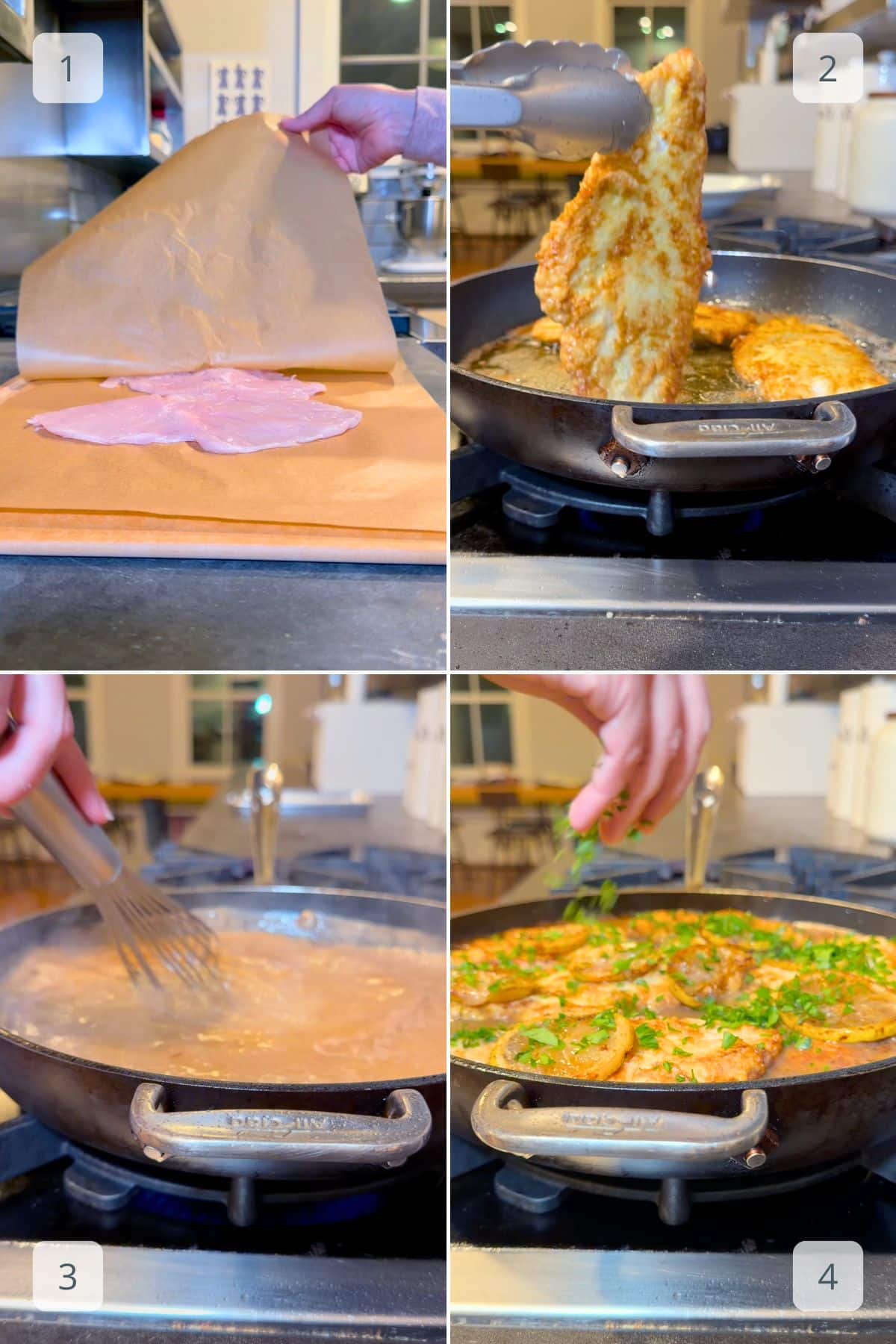
- First you’ll prep the chicken by cutting and pounding it into paillards, then dredging in seasoned flour and an egg wash.
- Cook the chicken in olive oil until it’s golden brown on both sides and just about cooked through. Give the lemon slices a quick spin in the hot pan.
- You’ll make the sauce with white wine, chicken broth, and lemon juice, and thicken it with a smooth paste of butter and flour.
- Add the chicken and lemon slices back to the saucy pan, cook for a couple of minutes to bring everything together, and sprinkle with parsley. That’s it!
Expert tips and FAQs
Yes! Substitute a good-quality 1:1 gluten-free flour blend for the all-purpose flour, and you’re all set.
A paillard is a thin, tender piece of meat (in this case, chicken) that cooks quickly and evenly. Here we’re creating them by slicing the chicken breasts in half to make two thin pieces (butterflying the chicken breasts but then cutting all the way through) and then pounding them with a mallet or rolling pin to tenderize and create an even thickness.
Beurre manie is a smooth paste made by mixing room-temperature butter and flour. It’s used to thicken a sauce at the end of cooking. Coating the flour with fat in this way allows it to mix easily into the sauce rather than getting lumpy.
Chicken Francese is at its dinner-party best shortly after nestling the chicken back into the sauce, but you can do a lot of the steps in advance and finish the dish shortly before serving. Prep and cook the chicken and make the sauce a few hours ahead if you like, keeping the elements covered separately. Right before serving, add the chicken to the sauce and warm through.
I think this dish makes excellent leftovers reheated on medium in the microwave or covered in the oven or toaster oven. It will keep for a week in a nice cold fridge.
More classic chicken recipes
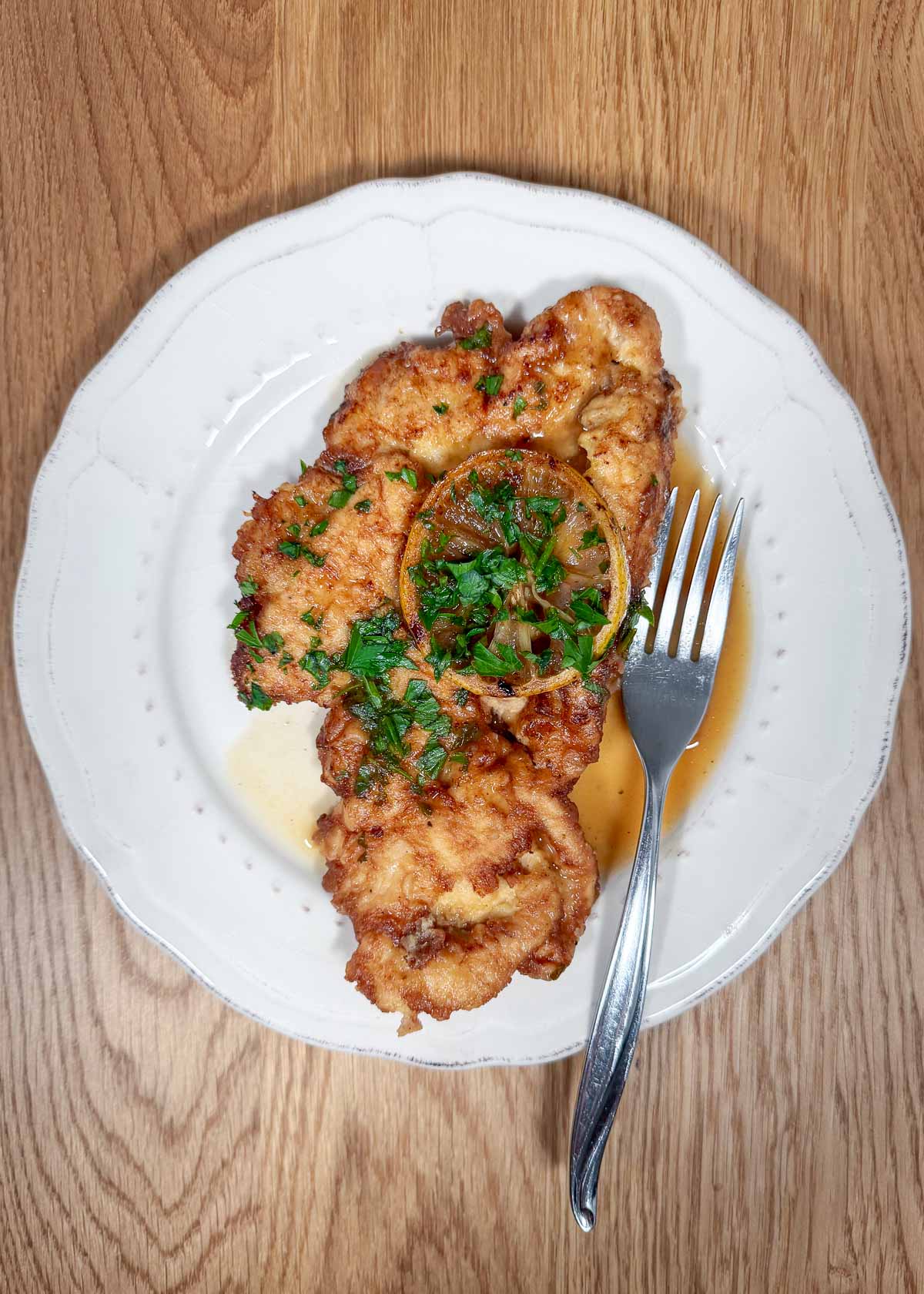
Summarize & Save This Content On
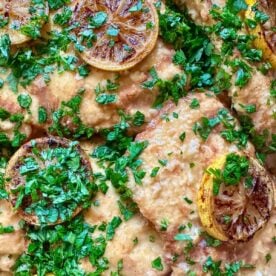
Chicken Francese
Ingredients
- 3 pounds boneless, skinless chicken breasts
- 1 ½ cups all-purpose flour
- 2 teaspoons fine sea salt, divided
- ½ teaspoon freshly ground black pepper
- 4 large eggs
- 2 tablespoons whole milk
- ½ cup olive oil
- 2 lemons, divided
- 1 cup dry white wine
- 3 cups lower-sodium chicken broth
- 3 tablespoons butter , at room temperature
- ¼ cup chopped fresh flat-leaf parsley
Instructions
- Pat the chicken breasts dry with paper towels. Slice each breast in half butterfly-style, but cut all the way through. Pound each chicken breast half to an even thickness of about 1/4 inch. (This also tenderizes the chicken, so don’t be shy.)
- In a large rimmed dish, mix together the flour, 1 1/2 teaspoons of the salt, and the pepper.
- Crack the eggs into another rimmed dish and beat together with the milk and remaining 1/2 teaspoon salt.
- In a 12-inch skillet, warm the olive oil over medium-high heat until it shimmers.
- Dredge each chicken piece in the flour mixture until thoroughly coated and then in the egg wash. Add directly to the pan. In a 12-inch skillet you’ll likely be able to cook three pieces of chicken at a time. (Dredge each piece immediately before cooking.)
- Cook for about two to three minutes, depending on thickness, until golden brown underneath and beginning to show signs of cooking halfway through. Flip and cook for another minute or two until chicken is just about cooked through. You can adjust the heat as necessary to cook the chicken through while browning but not burning. Remove from pan and set aside on a plate.
- Repeat until all chicken breasts are cooked.
- Slice one of the lemons into thin slices and remove seeds. Add lemon slices to pan in a single layer and cook until lightly caramelized on the underside, then flip and repeat. Remove from pan and set aside with the chicken.
- Add the wine to the pan. Scrape up any brown bits and stir into wine. When wine has reduced by half, add chicken broth.
- In a small bowl, mash together the softened butter with 1/4 cup of the leftover dredging flour mix to form a smooth paste. Add this beurre manie to the pan and whisk into the sauce until no lumps remain.
- Juice the remaining lemon and strain two tablespoons of the juice into the pan. (You can use more if you like a very lemony flavor.)
- Bring to a boil, then reduce heat and simmer briskly until glossy and gently thickened, about five minutes.
- Return chicken and lemon slices to the pan and simmer to re-warm. Season with additional salt and pepper if you like.
- Off the heat, sprinkle with parsley and serve.
Nutrition
Nutrition information is automatically calculated, so should only be used as an approximation.

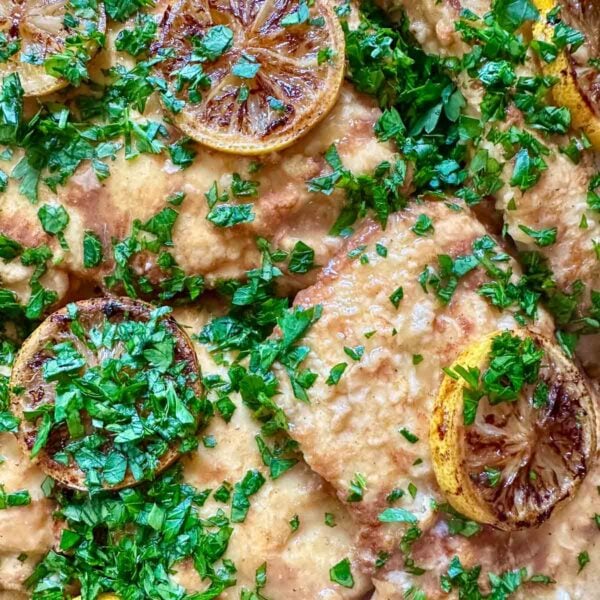
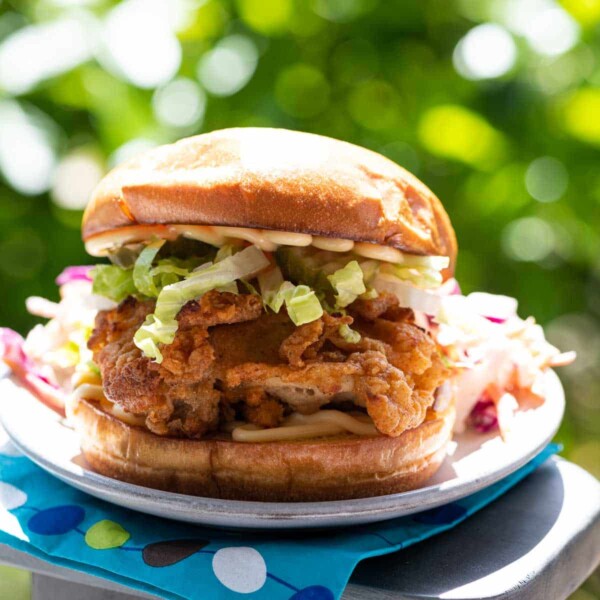
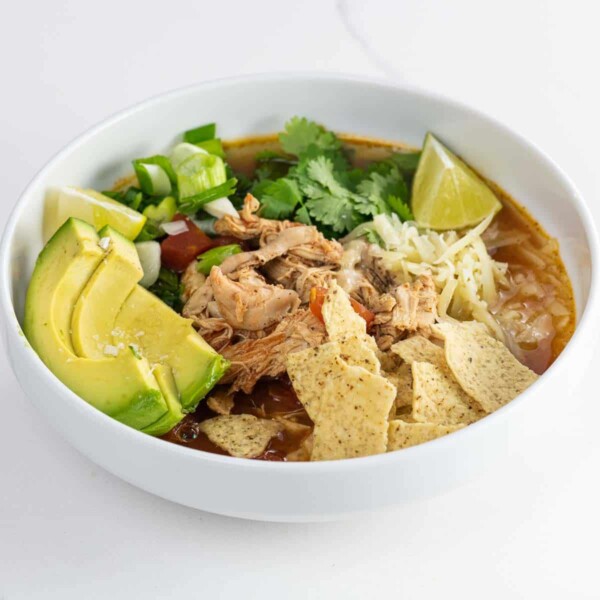
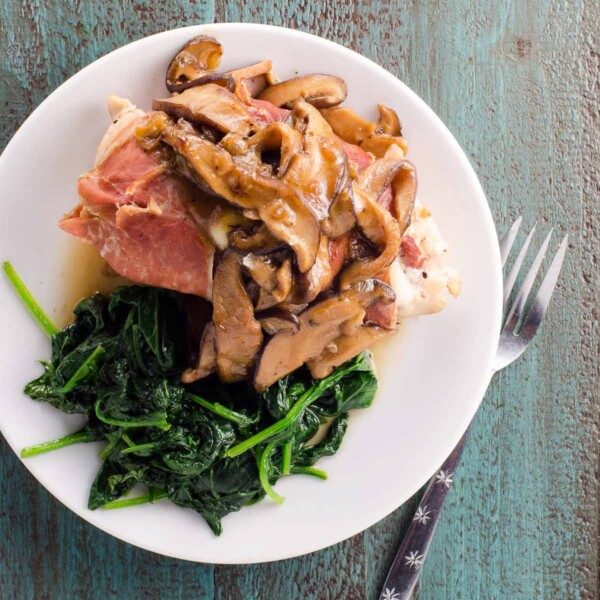

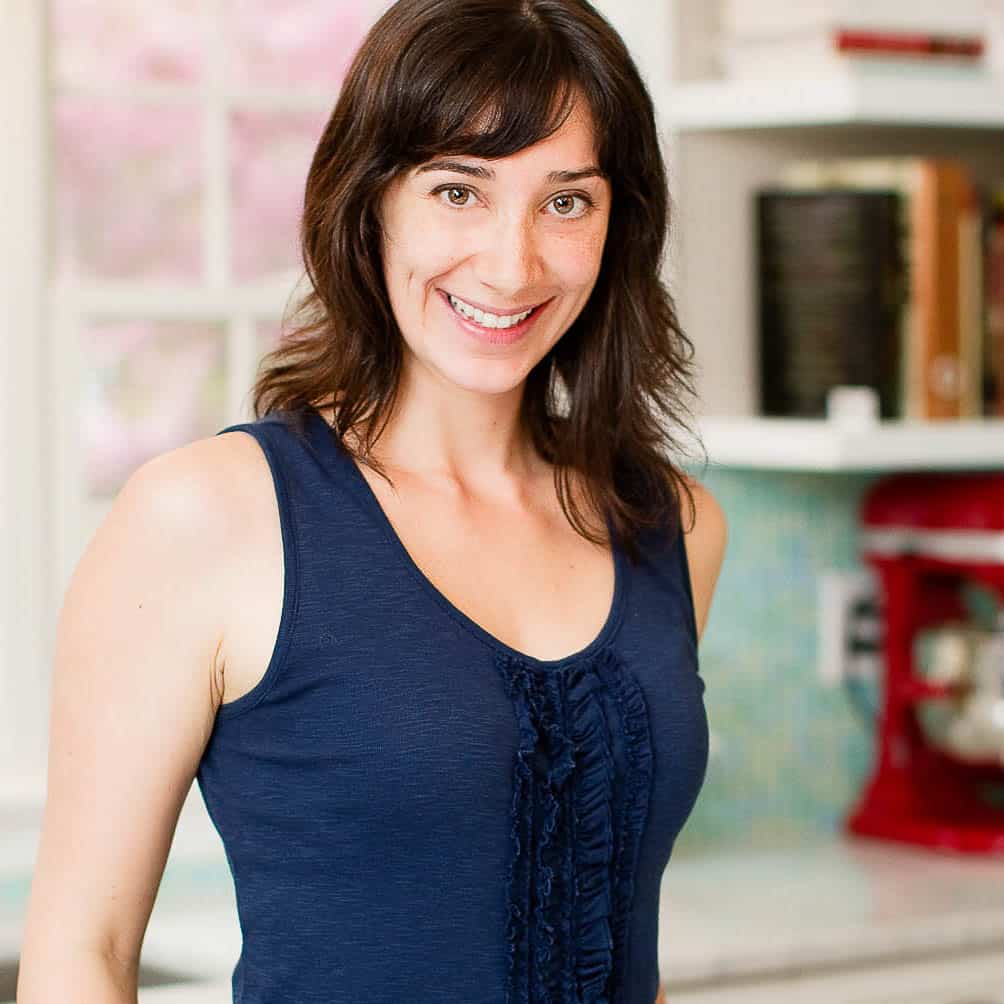






This dish feels like home turned up a notch. It’s comforting as it is exciting, and just so delicious.